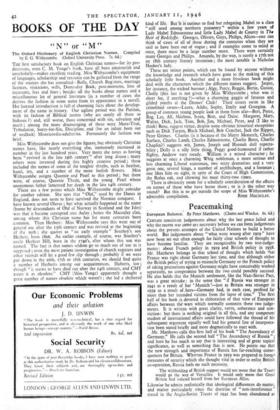BOOKS OF THE DAY
N 9 9 or " 114 9 t The Oxford Dictionary of English Christian Names. Compiled by E. G. Withycombe. (Oxford University Press. 7s. 6d.) THE first satisfactory book on English Christian names—for its pre- decessors, even C. M. Yonge's book, have all been amateurish and unscholarly—makes excellent reading. Miss Withycombe's equipment of languages, scholarship and resource can be gathered from the range of the sources she has consulted—Rolls, Church Registers, marriage licences, visitations, wills, Domeschy Book, post-mortems, lists of recusants, fees and fines ; besides all the books about names and a miscellaneous lot of general literature (in a number of cases she derives the fashion in some name from its appearance in a novel). Her learned introduction is full of charming facts about the develop- ment of the name in history. Our ugliest period was the Puritan, with its fashion of Biblical names (why are nearly all these so hideous ?) and, still worse, those concerned with sin, salvation and merit ; among the more discouraging of these were More-Trial, Tribulation, Sorry-for-Sin, Discipline, and (for an infant born out of wedlock) Misericordia-adulterina. Fortunately the fashion was brief.
Miss Withycombe does not give the figures, but obviously Christian names have, like nearly everything else, immensely increased in number in the last hundred years. Very many she notes as having been "revived in the late 19th century" after long disuse ; many others were invented during this highly creative period ; these included the names of some of the tougher shrubs, such as heather, hazel, ivy, and a number of the more foolish flowers. Miss Withycombe assigns Queenie and Pearl to this period ; but there were, of course, Queenie Thrale, and the young Pearl whose anonymous father lamented her death in the late ;Lath century.
There are a -few points which Miss Withycombe might consider for another edition. She says that "Olaf," used by the Danes in England, does not seem to have survived the Norman conquest. I have known several Olaves ; but what actually happened to the name (borne by descendants of Olaf of Norway in Scotland and the Isles) was that it became corrupted into Aulay ; hence the Macaulay clan, among whom this Christian name has for many centuries been common. Then Herbert: Miss Withycombe says this went out of general use after the 13th century and was revived at the beginning cf the 19th ; she quotes as "an early example" Southey's son Herbert, born 1806. An earlier example, of course, was Southey's uncle Herbert Hill, born in the 1740's, after whom this son was named. The fact is that names seldom go so much out of use as is supposed ; even the most patient investigation of church registers and other records will let a good few slip through ; probably if we were put down in the i6th, 17th or ifith centuries, we should find quite a number of Herberts among our acquaintances. Huberts, too ; though "it seems to have died out after the 14th century, and CMY treats it as obsolete." CIviY (Miss Yonge) apparently thought a great numbet of names obsolete which weren't ; she led a sheltered kind of life. But It is curious to find her relegating Mabel to a class "still used among northern peasantry" within a few years of Lady Mabel Edmonstone and little Lady Mabel de C,ourcy in The Heir of Redclyffe. Georges, °livers, Guys, Philips, Alices—one can think of cases of all of these during the centuries when they are said to have been out of vogue ; and if examples come to mind at - once, there must be a large number more. There were certainly many Georges and Philips. Amanda, by the way, is surely a 17th not an r8th century literary invention ; the most notable is Nicholas Hookes's lady.
These are minor ,points, which can be found by anyone without the knowledge and research which have gone to the making of this scholarly little book. Another and a more frivolous book might deal with the characters which the different names suggest. Jasper, for instance, the wicked baronet ; Algy, Percy, Reggie Bertie, Gussie, Cholly (this last is not given by Miss Withycombe ; what was it short for, if anything ?)—what a charming gaggle of fatuous and gilded youths at the Drones' Club! Their sisters swim in like crinolined swans—Laura, Addie, Sophy, Emily and Georgina. A group of common young people look at them from afar—Bert, Perce, Reg, Les, Alf, Marlene, Ireen, Beat, and Daise. Margaret, Mary, Walter, Dick, Jack, Tom, Bob, Jim, Michael, Peter, and (I like to think) Rose suggest virtue, despite some obvious historical exceptions such as Dick Turpin Black Michael, Bob Cratchet, Jack the Ripper, Peter Grimes. Charles (is it because of the Merry Monarch, Charles Surface, Charles Lamb, Charles Edmonstone, Charlie Bates, Charlie Chaplin?) suggests wit, James, Joseph and Hannah dull repecta- bility ; Dolly is a silly little thing, Peggy good-humoured if rather flighty, Andrew very steady. William is a mixed character ; he suggests at once a charming Whig nobleman, a more serious and less charming Liberal statesman, two witty dramatists and a very great one, several kings, a number of archbishops and a footman ; one likes him on sight, in spite of the Court of High Commission, the Rufus oak, and chewing his meat thirty-two times.
There is obviously room for a scholarly consideration of the effects on names of those who have borne them ; or is it the other way round? But this is to get outside the scope of Miss Withycombe's






























 Previous page
Previous page